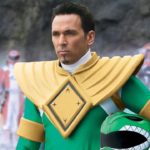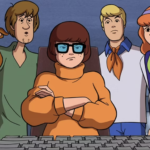Peter Panning sits at a table with the Lost Boys as they eat imaginary food. He does his best to imagine and find something, anything, to eat. Finally, during a playful throwing of “food,” one kid breaks through the barrier in Peter’s mind and he can finally see, touch and taste the things everyone else has been eating. And when they realize he can see it and he starts playing with them, the whole dinner scene goes from quiet and awkward to loud, exuberant and joyous. A piece of Peter Pan still exists inside Mr. Panning.
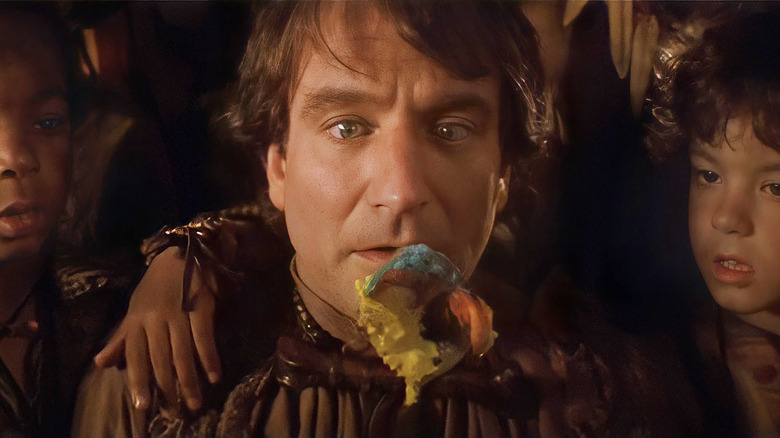
This is one of many classic scenes in Stephen Spielberg’s Hook, a film that he himself, along with many critics, pan as being his worst film to date. It has been chastised as exuberant, exorbitant and extravagant. They say it changed the source material in the wrong ways, that the sets are too colorful and artificial, and that Spielberg wasn’t actually confident in the script.
And all those are things Stephen Spielberg said about his own film. To this day, he refuses to watch it.
Yet commercially, it was the fourth highest grossing film of 1991 and became a seminal part of my, and many others, childhoods. I saw it in theaters multiple times as a child and we instantly bought it on VHS. And I hope that, somewhere, in a box inside the abyss of my family’s storage room, lies Robin Williams’ Peter Pan action figure from Hook. It had the most wear and tear of any figure I owned. I still love this film.
And yes, part of it is because I saw it as a child and I’m wearing nostalgia glasses that are coke-bottle thick. There are clear structural problems with the film and the exposition can be on the level of straight-to-Netflix kids films, which is to say it’s WAY too much. And why is Glenn Close in this movie for 60 seconds playing a male pirate in a boo box? Probably to be in the running for the Academy Awards that year but still, fantastic performance as always.
But underneath those structural problems lies something that, as both a father and a Peter in his mid 30s, I can see clearer than I could as a child: Peter is having a mid-life crisis.
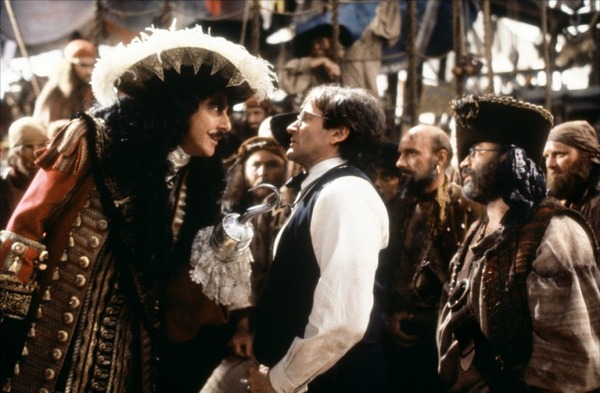
In the beginning of the film, Peter Panning is at work and is walking around an office (remember those?!) talking about merger and acquisitions of other companies. Most of these tend to be hostile takeovers and in the film Panning is fantastic at these. He is even described by his children as sailing in and blowing them out of the water. And Wendy has a very interesting thing to say to him.
“Peter, you’ve become a Pirate!”
Think about that line for a minute. Peter Pan grew up and became a pirate. The one thing he fought against as a child for who knows how long. Yet, in the end, Peter grew up to embrace that ideology in a complete 180 degree reversal, not unlike many adults today. Let’s do an experiment.
I want you, wherever you’re sitting and reading this right now, to think back to the first time you remember people asking you what you wanted to be when you grew up. Think about how that first thing you wanted to do brought you joy when you thought about it. I’m going to take a roll of the dice and say that most, if not all, of those reading had a very different idea of what they were going to do when they were kids.
And it was shoved down as some flight of fancy, some imaginary thing that can’t be attained. That, it was said to many, is part of growing up. That misery of losing your dream or the path you wanted to take has to occur. Now some might have grown up to do what they wanted, but it’s not what they imagined. Even here, some of that childish magic dies within us. And we say to ourselves, “I guess this is growing up.” Then some pop punk guitar chorus plays in the background somewhere.
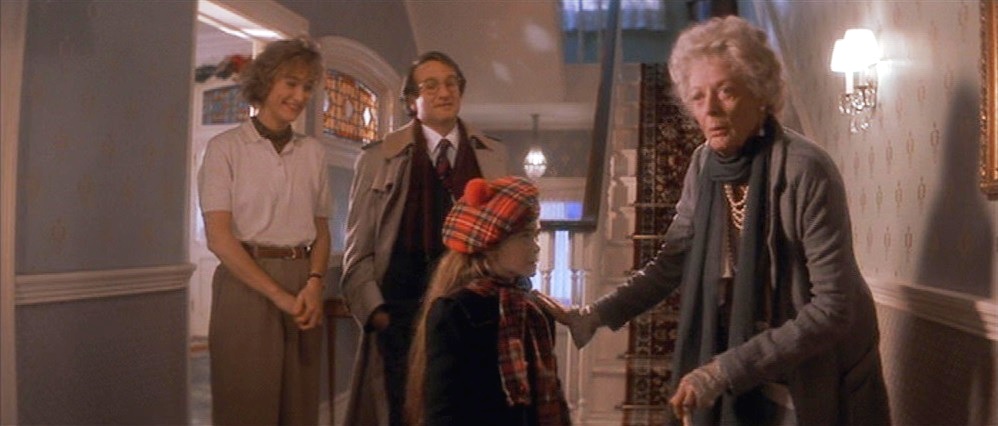
But this makes Peter completely miserable. So much so that he tries his damndest to snuff out any sort of childish magic for his children. Most of the time they just want him there or want to play with him, but both Maggie and Jack are always told to stop, or grow up, or leave him alone. This is shown perfectly in the phone call before Hook captures the children, when he is trying to secure a 5 billion dollar merger (the equivalent of more than 11 billion today) and Jack is pretending to shoot his dad like a pirate. Peter flips out and screams at the children like a monster, with his shadow looming over both him and them like a tyrant. It makes you, in the audience, feel like Jack and Maggie being yelled at and it really can make you jump.
But the only way Peter Panning can save his kids when he comes to Neverland is through learning to reconnect with Peter Pan, the ageless child he used to be in the magical realm, or he’ll never defeat Captain Hook. And, maybe a little too late in the film’s runtime, we start to see Peter Pan all grown up in full force. Unfortunately, like everyone else in Neverland, he starts to forget his life again.
By rediscovering his inner child, Peter gets lost in his newfound happiness and freedom. He feels that he always was supposed to be this way and starts acting like a child again, with no responsibilities or goal outside of having fun. He even forgets Maggie and Jack for a small portion of the film due to Neverland’s effect. We too can do this when we try to discover this piece of ourselves.
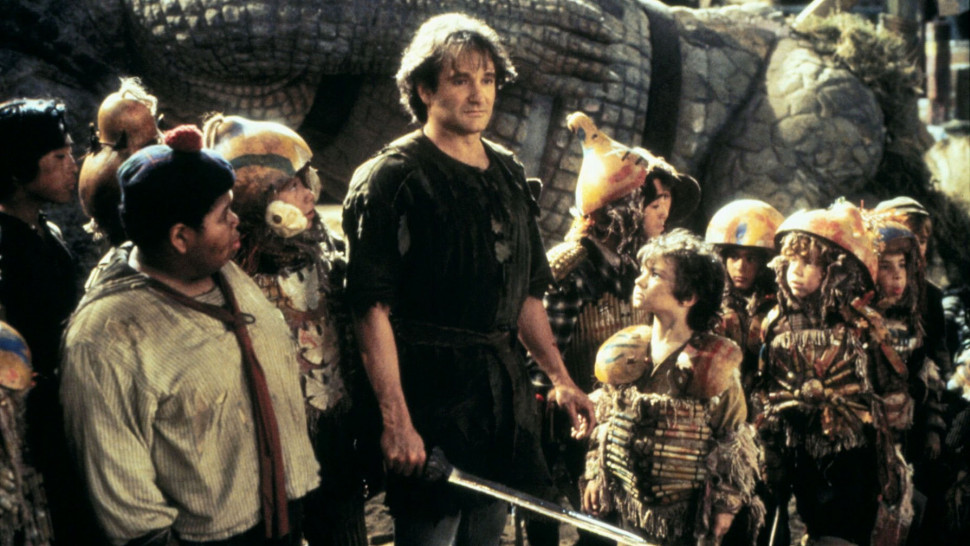
Unfortunately, acting like this and abandoning your family and responsibilities in favor of having fun and “living your life while you can” is called a “mid-life crisis” and is highly discouraged by your partner, children or pets you may have. And no, you wouldn’t look good in that car (save your money).
Rubberbanding the other way isn’t the answer to destroying the misery of adulthood. Hook is so focused on not being childish and living forever as an adult that he has no joy in his life. The pirate’s life is supposed to be one of adventure and life-threatening risks, but Hook has lived so long he’s survived all of it. The only hope for adventure he has left is actually dying and seeing what happens next. And Peter went from being a Wall Street Captain Hook to a fun-loving 9-year-old faster than you can say “Bangarang!”
Rather, it is being able to let loose and be a kid with your kids and be an adult when you need to be an adult that the film is trying to cultivate. It’s only when he achieves the balance of both at the very end of the film that he can save his children, bring them home and become one with his family. He is able to stand triumphantly and look out the window at the London skyline in the sun with his wife and children.
We don’t have to change and destroy everything in our lives to change our lives. Rather, it takes introspection and a lot of work to find what you lost within yourself. And it may mean that, at this moment, life isn’t what you thought it was going to be. But that’s okay. Life isn’t what anyone thought it was going to be. How could you, let alone anyone else, know what was going to happen. But that doesn’t mean you have to lose that child within you. You don’t have to lose the wonder and joy of discovering life.
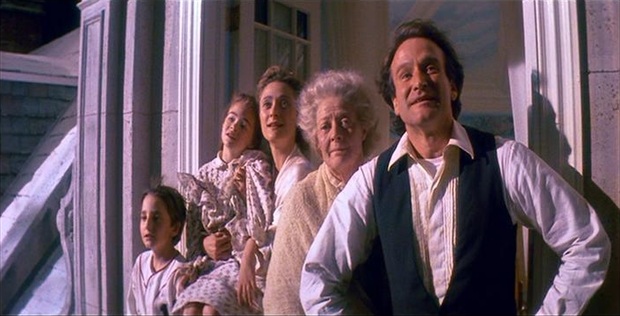
“Oh, no. To live, would be an awfully big adventure.”


